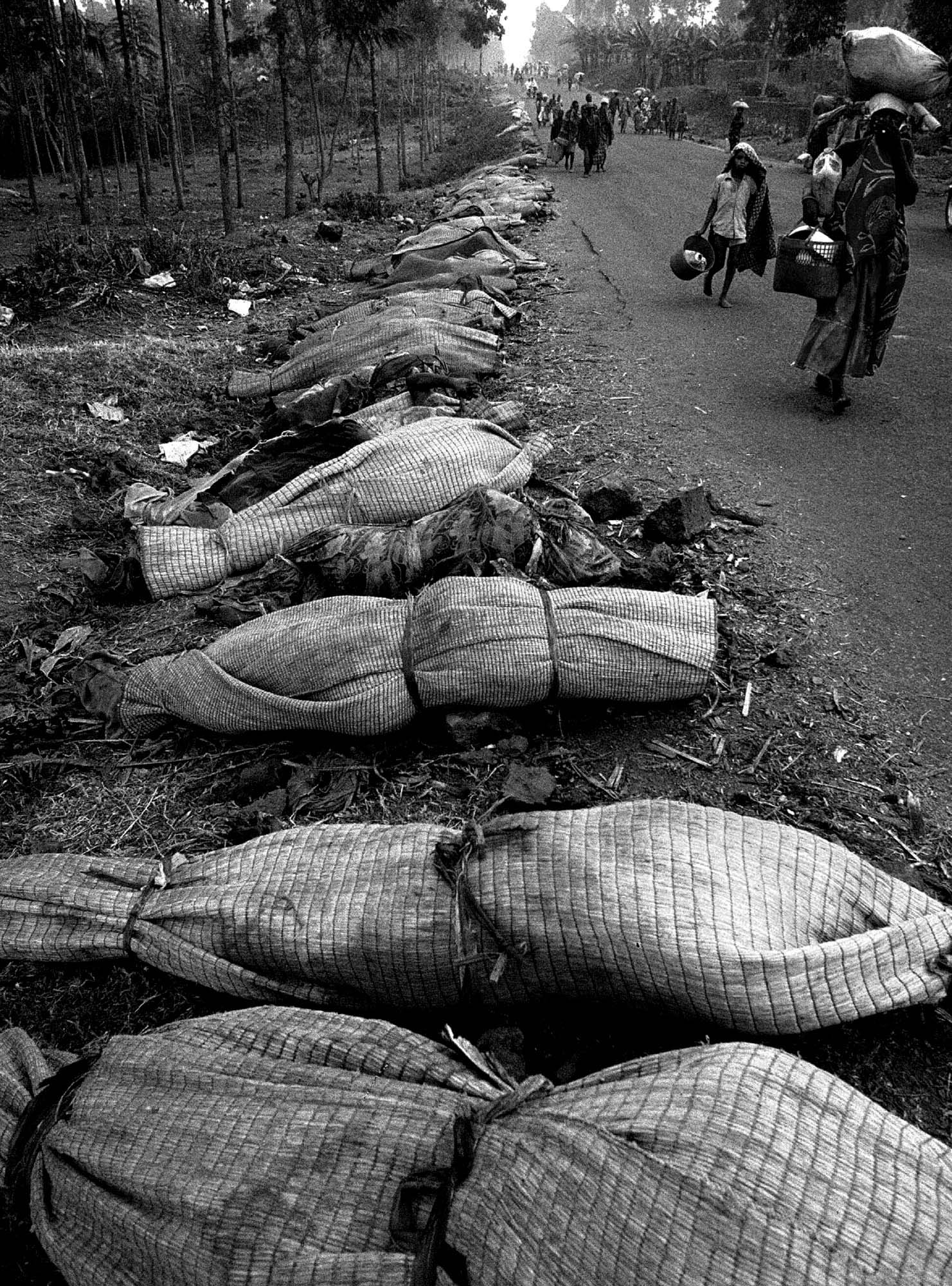Rwandan Genocide 1994

Our six-seater Cessna sways from side to side as we approach Goma Airport, on the Rwandan border and banks of Lake Kivu. Below is a sea of human debris. Humanitarian aid, military trucks, refugees, and media vehicles, painted across a red dusty landscape. At the Mbiza Hotel, I hand over my passport to the receptionist for check-in and request a currency exchange of US$30 to New Zaïre. The receptionist disappears for a few moments, returning with a bundle of cash, the size of a bale of hay, tied tightly with rope. Following the collapse of the government and breakdown of fiscal and monetary control, hyperinflation crippled the country. Government spending surged, banks collapsed, and people’s savings became worthless. Inflation now stands at twenty-four thousand percent. Throughout Goma, there is a pervasive sense of hopelessness and chaos. People collect filthy water with buckets from Lake Kivu, despite knowing that a cholera pandemic is sweeping across the region. In desperate times, it's better to drink and die, rather than not drink at all. Makeshift homes have sprung up everywhere, with people's belongings, suitcases, and clothes hanging from trees and fences.
The RN2 highway leading north is at a standstill. Pick-up trucks, mini-buses, and cars full of people are trying to get out, to escape, to be anywhere else but here. The dead lay on either side of the road, piled high, wrapped in wicker mats, rugs, blankets. Some are not given the dignity of being covered. Their stiffened, bloated, decaying bodies, covered in flies, lay rotting in the murderous stifling heat. They lie where they are dumped. On and on, we pass them. The stench of death is thick in the air. The world has gone mad, and this is the capital of hell. We pass a young boy, six or seven years old. He stands with his hand out, like a human statue. His face is frozen with fear and shock. His lifeless eyes look straight through us. For the living, we cover our faces and dare not look for too long into the eyes of the dead, for if anything, to preserve the sanctity of our minds.
For what is seen cannot be unseen, and what is lived through in the light of day is carried with us in the dark of night. We pass a giant dump truck full of bodies, where men are busy throwing corpses into an enormous, bottomless burial pit.
I jump out of our jeep, and as I take pictures, the earth moves beneath my feet. I fall. Landing in the middle of the pit, hundreds of bodies lay around me. Some have been stripped naked, others are missing limbs. The look of horror etched across their faces. ‘You fucking idiot, ’ Nick shouts, laughing under his breath. Getting to my feet, respectfully as I can, I clamber over the bodies and back up the side of the pit, dusting myself off. I raise my camera to my eye to get a few more frames and to steady myself. My hands shake, and cold needles run up my spine. From my periphery, I catch sight of a man behind me.‘Andy, watch out!’ Nick screams, who by now is back in the Jeep. As I turn, I can see him wielding a machete, bounding toward me. I wait, sensing there is little time to flee. Stopping just inches from my face, he displays a rage that only a killer can understand. His eyes are not his own. I wait for him to bludgeon me with his wide blade, but instead, we look at each other, and a calm falls over us. I look down at the machete he is holding. Blood trickles down his palm, along the blade, down into the dry red earth.
We arrive at Kibumba refugee camp, at the foot of the Virunga Mountains. The vast expanse of blue and white tarpaulin shelters and dilapidated huts is now home to some 180,000 Hutu refugees. As civil war ensued following the Tutsi genocide, Hutus, fearing reprisals, fled the country en masse. The migration of over a million people has significant consequences for Virunga National Park and the gorillas that inhabit it. As I walk through the camp, tree stumps begin to appear, one after the other. Then, there are more and more, stretching as far as the eye can see. They mirror the number of dead along the roadside.
The humanitarian crisis is also an environmental disaster. The constant demand for fuel wood has contributed to the depletion of vast swathes of forest land. I think of the Penan and wonder how they are. They are at least better off than these poor souls. A feeling of doom hangs over the place. Here, there is no future, only the cruel reality of today. Refugee camps are a place of last resort. They are the result of terrifying conflict or unimaginable natural disasters. They, too, can be a hotbed of violence, crime, and disease. In congested, unsanitary conditions, with little to eat and a lack of clean water, the pressure to survive is immense and daunting.
Violence, particularly sexual violence against women, is rife. In a city of desperate people, sickness spreads quickly. As the light fades over Kibumba, long shadows are cast across a weeping landscape, and as smoke billows out from countless fires across the camp, the people of Kibumba hope they may find solace in a broken sleep before a new day in hell dawns. In the weeks and months that follow, not only do people have to contend with marauding gangs of militia, but a cholera outbreak rages through Goma, killing thousands of people every day. A million people die in just three months. My brother and I don’t talk about these dark days. At night we drink. We drink to forget. We drink to unsee the seen.


